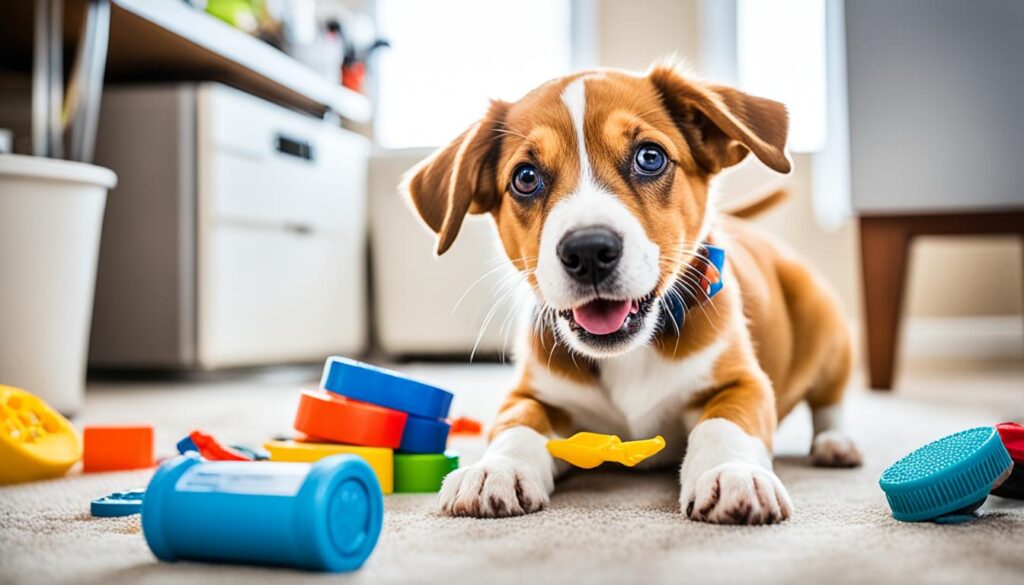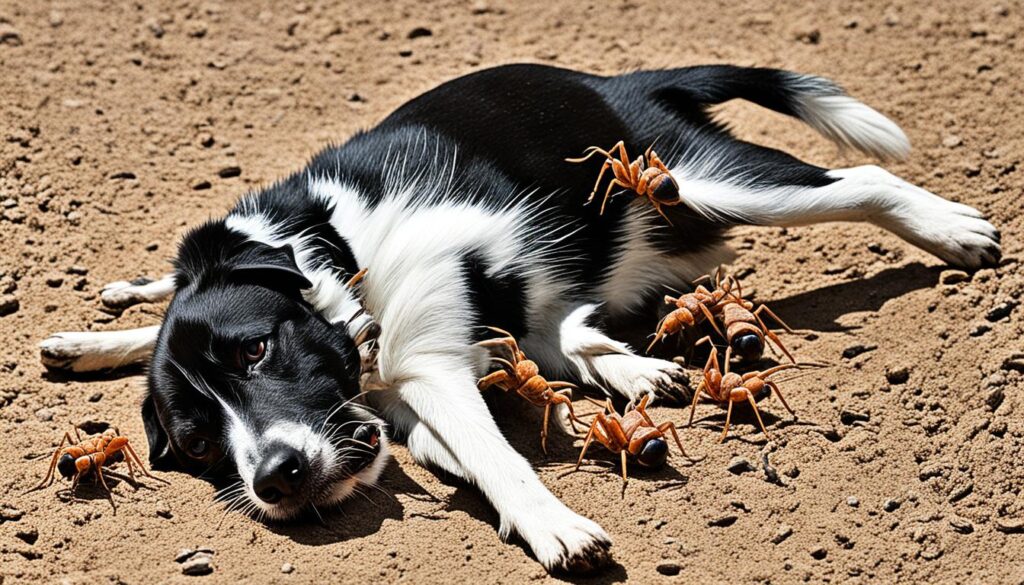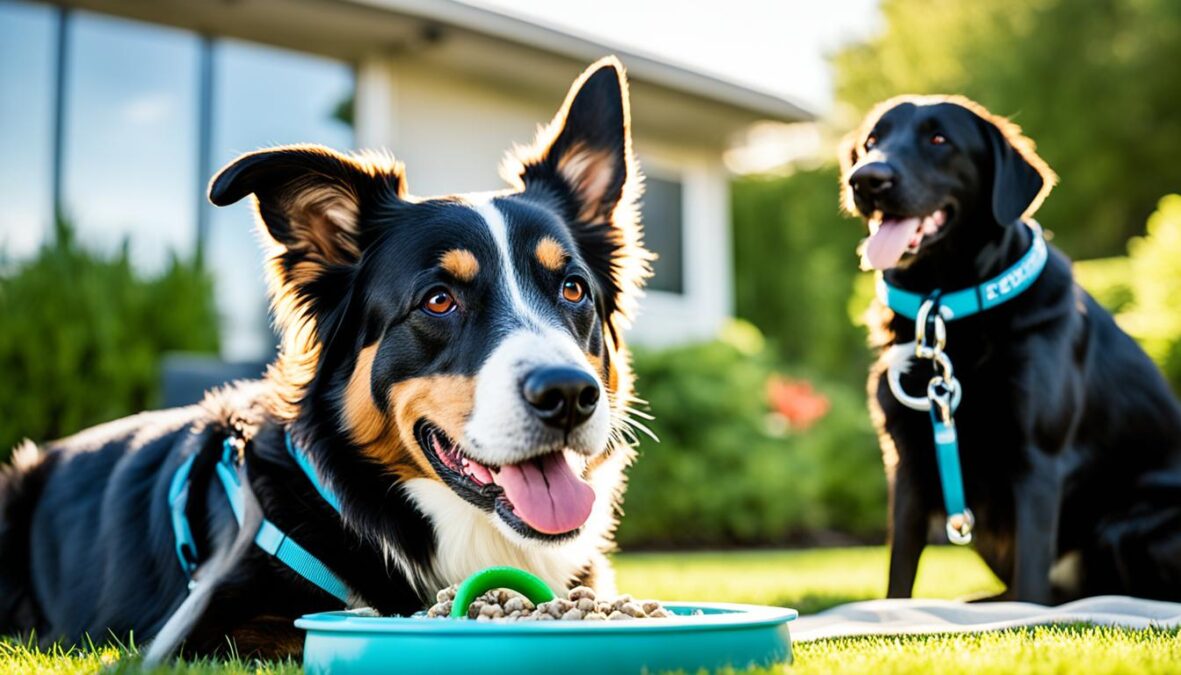Are you crazy about your dog and want them to be happy and healthy always? You’re not alone. Every dog lover dreams of a lasting friendship with their four-legged buddy. Thankfully, there are easy ways to care for your pet and see them thrive.
Your pet isn’t just any animal; they’re family. You hope your dog or cat lives a long and joyful life with you. Luckily, there are tricks to keeping your furry friend healthy.1 Simple everyday steps can make you the best pet owner. They ensure your canine friend has a great life with you.
Key Takeaways
- Providing proper nutrition, including high-quality dog food, is essential for your pet’s health and wellbeing.
- Regular veterinary check-ups and vaccinations are crucial for preventing serious diseases and detecting health issues early.
- Daily exercise, grooming, and mental stimulation are all important for keeping your dog happy and healthy.
- Ensuring a safe, secure environment and proper identification methods can help reunite you with your pet if they ever get lost.
- Addressing behavioral issues through training and positive reinforcement can strengthen the bond between you and your furry friend.
Follow these easy dog care steps, and your furry pal is set for a long, happy life. But, what’s often missed yet super important in pet care? Let’s uncover that next!
Providing Proper Nutrition
Ensuring your dog gets the right dog nutrition is key for their health. Dogs require a mix of nutrients such as proteins, fats, vitamins, and water2. For the best nutrition, choose dog food that is labeled “complete and balanced” or meets AAFCO standards2.
Choosing High-Quality Dog Food
Dry and canned dog food offer good nutrition, but dry food may be better for teeth2. Essential amino acids come only from their food, since dogs can’t produce enough themselves2. Essential fatty acids are also vital for their energy and the health of their skin and hair2. Carbs from grains and veggies provide needed energy, starches, and fiber2. It’s crucial to include vitamins like A, D, E, and important minerals in their diet2. Water is essential too, making up over half of your dog’s body weight2.
Avoiding Unhealthy Fillers and Additives
Many dog food brands add unhealthy fillers that don’t help your pet. These cheap ingredients can make dogs feel tired and look less healthy. Choosing high-quality food is important because it enhances your dog’s immune system and overall health.
Considering Dietary Supplements
Your vet might suggest dog supplements for specific health needs. Supplements can be good for your dog’s health and fill in any nutrition gaps2. Always talk to your vet to decide the best nutrition plan for your dog2.
Regular Veterinary Check-ups
Keeping your pet healthy is very important. Regular visits to the vet are key.3 Even though pets might not like the vet, these checks keep them well.
Importance of Annual Wellness Exams
As pets get older, unseen health issues might emerge.3 Check-ups can find tiny clues of big problems.3 They tell a lot about your pet’s health like eyes, ears, teeth, and circulation.3
Vaccinations and Preventative Care
Vaccines are crucial for keeping pets and others healthy.3 Up-to-date shots help avoid spreading sickness.3 Also, using products to prevent fleas, ticks, and heartworms protects your pet.4
Seeing the vet regularly is a smart move. It can save a lot of money and keep pets happy.3 Being proactive with health means fewer surprises and a better life for pets.4
Grooming and Coat Care
Keeping your dog clean is essential for their health. It also helps you bond with your pet. You should regularly brush their coat, give baths, and clean their teeth. This care prevents skin problems and lets you spot health issues early. For instance, you might find bumps and ticks while grooming.5 Taking care of your dog’s teeth is vital, too. Plaque can cause big problems as they get older.
Brushing and Bathing
6 Dogs need baths every six to eight weeks. But, how often depends on the dog’s size, age, and type of fur. Some need it more often if they get messy or smelly.7 Dogs with long or curly hair need daily brushing. This keeps their hair from tangling, which is painful. For all dogs, brushing helps remove dirt and loose hairs, no matter the hair length.
Nail Trimming
6 Long-haired dogs should see a groomer every 2-4 weeks. Short-haired dogs can go 6 weeks between visits. Groomers usually check that pets are up to date on shots and have no fleas.
Dental Hygiene
7 Never use baby shampoo on dogs. Their skin is different, so it might hurt them. Always use warm water for a bath. It cleans better than cold water. After a bath, use a conditioner to keep their skin healthy and reduce dandruff.
Exercising Your Dog
Keeping your dog active and healthy is key. The first source says daily exercise is important for you and your dog. It keeps the mind, body, and spirit well. This routine is great for maintaining a healthy weight and strong bones.8
Daily Walks and Playtime
A simple daily walk or a game of fetch works wonders. It helps with physical health and keeps your dog’s mind sharp. Make activities more fun by trying different games or obstacle courses. This keeps them entertained and interested.8
Engaging in Physical Activities
There are many fun physical activities for you and your dog.8 For instance, skiing with a dog over 30 pounds is like a 30-minute walk, five times a week. Just 20 minutes of skiing three days a week holds the same benefits. But always consider your dog’s health and prevent any risks, especially for breeds prone to breathing issues.8
It’s good to mix up exercises to keep your dog healthy and happy.8 Regular workouts are great for both of you. So, mix it up and enjoy the outdoors together.
Mental Stimulation and Training
Exercise is key, but mental workouts are vital for your dog too. Dogs not mentally busy might chew stuff or act restless.9 Keep them happy and good by training them or giving them fun toys and games.
Obedience Training
Obedience training challenges your dog and builds good habits. You can do this yourself or with a trainer. Learning new commands and tricks helps your dog stay sharp and enjoy new things.9 It’s fun with shaping, where you praise what they do right to learn new stuff.
Interactive Toys and Puzzle Games
Interactive toys and puzzle games are great for your pup’s mind.9 These tools can train their problem-solving. Games like the shell game make them think.9 And making obstacle courses from home items is cool for their mental workout.9
Any change or game that uses their brain is good for them.10 Swapping toys every week can help them stay curious and happy, like they’re always getting new toys.10
Providing a Safe Environment

Keeping your dog safe is very important. A secure space lets your dog feel calm. This is good for their training and behavior. It shows how vital a safe environment is for a dog’s well-being.11
Dog-Proofing Your Home
Watching your dog and making your home safe are crucial. The article advises using things like comfort items and safety measures. These make the space better for your dog.11 To keep your dog entertained in their safe zone, add toys and activities. This is especially helpful for times when they’re alone.11
Training your dog to go to its safe spot in troubling times is smart. It shows the space is a good place for the dog. This also supports positive habits.11 Make sure the safe area is really safe, with no dangers around. Watch out for things like choking risks.11
Proper Identification and Microchipping
Having the right ID for your dog is critical. It helps if your dog ever gets lost. A tag and microchip are good ways to do this.11 Getting your dog regular vet visits is also vital. This is part of keeping your dog healthy and happy. Pet owners benefit from expert advice on safe pet spaces.11
Socialization and Bonding
For a dog to flourish in our world, socialization is key.12 Well-socialized dogs view people as pals. They also feel at ease around other dogs. In contrast, dogs that didn’t learn social skills often act scared or aggressive.
It’s best to start socialization young, before your pup is 6 months old. This is when they’re kids, especially effective at 8 to 16 weeks.12 This early training sets the stage for a lifetime of positive interactions.
Introducing Your Dog to New People and Animals
Teaching a dog to feel Safe in different situations matters a lot.12 Positive reinforcement, like using treats, toys, and kind words, teaches dogs that the world is good.
To earn a dog’s trust is crucial for their socialization.12 Recognizing and respecting a dog’s comfort level during training and socializing is essential. This builds a stronger foundation.
Spending Quality Time with Your Dog
The most important bonding time with a puppy is from 3 to 14 weeks.13 This is when they learn the most about the world and trust you the most. Using delicious treats can make this bonding even faster.
Hand feeding is a powerful trust builder with dogs. It is very effective in setting rules and helping them feel secure.13
For well-adjusted dogs, introduce them to various people, places, and things early on in a positive light.13 Encouraging gentle handling and staying calm is key to their socialization and well-being.
Looking at your dog, talking to them, and giving them praise strengthens your connection without always needing treats.13 Focusing on bonding with your puppy and introducing them to different situations has a huge impact on their future behavior.
Walking your dog is vital for socialization.14 It helps the dog and owner spend more time together. Plus, it’s a good way for your dog to meet new people and pets in a controlled setting.
Regular walks help dogs stay calm and happy.14 Making walks fun is important. This way, it doesn’t feel like a boring routine for you or your dog.
Approaching Valentine’s Day, remember to cherish your pet by doing fun activities with them.14 Walking together is a simple but effective way to strengthen your bond.
Parasite Prevention and Control

Keeping your dog safe from parasites is very important.15 Creatures like fleas, ticks, heartworm, and others can harm your dog.15 They often lead to serious health problems.15 Giving your pet the right medications can protect them from these dangers.
Flea, Tick, and Heartworm Preventatives
15 Fleas can make your pet sick by taking too much blood. They can also give them tapeworms and disease.15 Ticks spread infections like Lyme disease.15 Heartworm is quite dangerous and comes from mosquitoes. It can hurt your pet’s heart and lungs seriously.15
You can help by using medications, flea and tick collars, or monthly preventatives for your dog.15 These methods are good at stopping the problems these pests bring.15 They are also cheaper than treating these illnesses, especially heartworm.
15 Don’t forget about worms too. They can be deadly for dogs with weak immune systems.15 Look out for signs like diarrhea and weight loss.15 Testing your dog’s stool for worms yearly is smart. And, remember to deworm your dog at least four times a year.
Being proactive and using preventatives can keep your dog safe. Learn more about how to keep your pet healthy here.
Addressing Behavioral Issues
Good dog owners know dog behavior and training matter a lot. The third source tells us training and making sure your dog is around others are key. This helps your dog learn key rules and polite behaviors. It cuts down on behavioral issues.16
Seeking Professional Help if Needed
Sometimes, you can fix dog behavioral issues with hard work and rewards. But, there will be times when calling in a pro is the smart move. These experts can figure out why your dog might act out and make a plan just for you both.16
Positive Reinforcement Training Methods
The best way to improve your dog’s behavior is through positive reinforcement. This means not focusing on punishment. Instead, you reward good actions. It’s a kinder and more lasting way to change your dog’s ways.16
Don’t see dog training and handling behavioral issues as a last chance. It’s something you work on regularly. This is to keep your dog healthy and make your bond stronger. With care and the right steps, you can have a dog that’s both sweet and well-behaved.16
Senior Dog Care
As dogs grow older, they need special care. This starts around age seven. It’s beneficial to switch them to a senior dog care diet. Watch out for any changes in their behavior. Things like not eating much, eating a lot, or sudden weight loss should be checked by a vet. This could be because of health issues.17
Monitoring for Age-Related Health Issues
Vet visits are a must for older dogs. This helps catch any health problems early. Routines checkups, including blood and urine tests, are recommended at least once a year. This is to look for chronic diseases.18 Make sure senior dogs get enough exercise and mental challenges. But, be careful with loud noises around them. These can scare them if their hearing or eyesight has gotten worse.17
Adjusting Diet and Exercise Routine
Older dogs have different dietary and exercise needs. Dog diet and dog exercise routines must change to keep them healthy. When a dog turns 7-9 (7-5 for larger breeds), it’s a senior. Instead of a long walk every day, opt for two shorter ones.19 Grooming regularly is key. It lets you spot any issues early. Older dogs, especially less active ones, might need their nails trimmed more often. This can be done at the vet.17
Looking after your senior pooch’s health and changing their routine keeps them healthy and happy.171918
Conclusion
By following easy dog care and pet care tips, you can help your pet live a long, happy life. Make sure your dog eats well20, gets checked by a vet often20, and is active. Keep your dog clean, keep them entertained, and make sure they’re safe. It’s also vital to make sure they get along with other pets and don’t get bugs.
If your dog shows any unusual behavior, do something about it quickly. As they get older, adjust their care too20.
The more you play outside with your dog, the more joy you both get21.
Putting effort into your pet’s health and well-being makes your bond stronger. With these pet owner tips, your dog will always be a treasured part of your family.
This article gives a detailed guide to dog care and pet care. With the right attitude and effort, you can have a very happy life with your pet.
FAQ
What are some tips for providing proper nutrition for my dog?
Choose pet food loaded with good vitamins, minerals, and protein. Stay away from foods with bad fillers, sugars, and carbs. These are not healthy for your dog.
Why are regular veterinary check-ups important for my dog’s health?
Check-ups can catch hidden health problems early. Vets can suggest exercises or medicines. They also give vaccinations to stop diseases.
What are the benefits of grooming my dog regularly?
Grooming stops skin issues and helps spot health signs early. It makes you and your dog closer.
How can I ensure my dog gets enough exercise?
Take your dog for daily walks and hikes. Play fetch and use interactive toys. This keeps their body and mind healthy.
Why is mental stimulation important for my dog?
Mental activities prevent boredom and bad behavior. Obedience training and puzzle toys keep your dog happy.
How can I create a safe environment for my dog at home?
Watch your dog and make your home safe with pet-proofing. Always have them wear a collar and chip in case they get lost.
What are the benefits of socializing my dog?
Early socialization teaches your dog to interact well with others. It builds a stronger bond when you spend time together.
Why is parasite prevention important for my dog’s health?
Parasites like fleas and ticks pose serious health risks. Use preventatives to keep your dog safe and avoid expensive treatments.
How can I address any behavioral issues my dog may have?
Teach your dog with positive training. Get help from a professional if needed. Be proactive and don’t wait.
What should I consider when caring for my senior dog?
Watch for changes in health and adjust their care as they age. Keep them healthy and joyful in their senior years.
Source Links
- https://thecrossroadscarmel.com/everyday-pet-care-tips/
- https://www.webmd.com/pets/dogs/dog-nutrition
- https://www.zoetispetcare.com/blog/article/regular-veterinary-check-ups
- https://abcvetoflewisville.com/blog/early-detection-lifelong-protection-why-regular-vet-check-ups-are-essential-for-your-pet-s-health
- https://www.fourpaws.com/pets-101/grooming-gateway/dog-coat-types
- https://www.ridgetowneanimal.com/services/dogs/dog-grooming
- https://vcahospitals.com/know-your-pet/grooming-and-coat-care-for-your-dog
- https://www.webmd.com/pets/dogs/ss/slideshow-exercising-with-your-dog
- https://www.dogseechew.in/blog/brain-training-for-dogs-how-to-mentally-stimulate-a-dog
- https://www.petmd.com/dog/general-health/ways-to-keep-dog-mentally-stimulated
- https://bettervet.com/resources/pet-safety/safe-place-for-dogs
- https://robertcabral.com/socialize-your-dog/
- https://zendogtraining.net/how-to-bond-with-your-dog-or-puppy/
- https://courtneyspetcare.com/blog/socialization-and-bonding/
- https://www.metrovetchicago.com/services/dogs/blog/how-parasite-prevention-plays-key-role-your-pets-health
- https://www.merckvetmanual.com/behavior/normal-social-behavior-and-behavioral-problems-of-domestic-animals/behavioral-problems-of-dogs
- https://www.rspca.org.uk/adviceandwelfare/pets/dogs/health/seniordogs
- https://vcahospitals.com/know-your-pet/dog-care
- https://www.medvet.com/senior-dog/
- https://geofflepard.com/2018/06/12/its-a-dog-gone-conclusion/
- https://latterdaysaintmag.com/welcome-home-conclusion-of-the-story-of-bob-the-dog/

